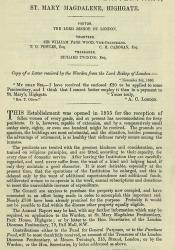Christina Rosetti Volunteers at the London Diocesan Penitentiary
Early in the year of 1859, Christina Rosetti began volunteering at the London Diocesan Penitentiary, otherwise known as the Highgate Penitentiary, due to its location within the district of Highgate, London. As denoted by an advertisement for the house from an 1860 edition of the newspaper, The Morning Post, this penitentiary was an "establishment for fallen women of every grade." More specifically, many of the women under its care had previously worked as prostitutes. The reform house inculcated these women with religious principles and fitted them with the abilities to complete domestic tasks expected of the typical Victorian woman, in an attempt to reform and reintegrate them back into English society. What is of note concerning Rosetti's work volunteering with this organization is that it is concerned entirely with reinventing the fallen women - essentially, women who have used sex work as a means of income. Instead of ostracizing them (as was common within Victorian society, due to prostitution being seen as a moral ill), the penitentiary was attempting, in a sense, to redeem these women. With this in mind, it is easy to recognize the religious parallels between Rosetti's volunteer work, and her work "Goblin Market", which, at its most basic interpretation, is a poem about a sister saving her sibling, who has committed a grave sin by consuming forbidden goblin fruit.
Principle Sources:

